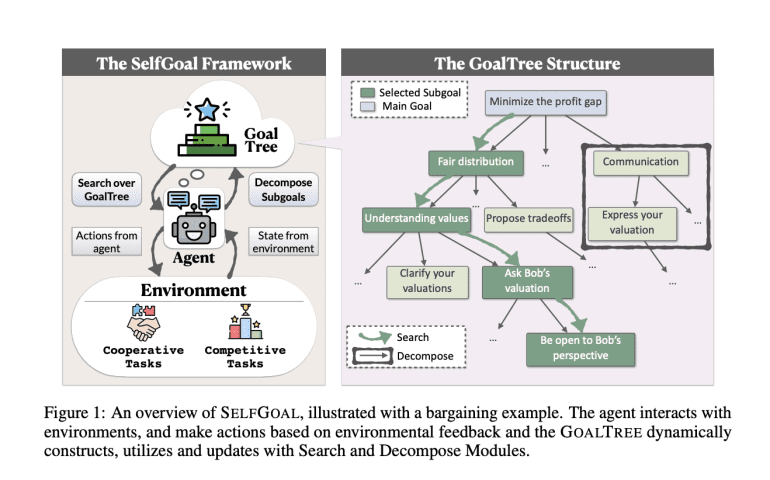- Development of autonomous language agents by leveraging large language models to handle complex tasks without specialized training.
- Challenges in addressing vague, high-level goals and the lack of practical frequent model retraining.
- Existing methods include initial task breakdown and retrospective experience consolidation, both with notable limitations.
- SELFGOAL framework employs a self-regulating system using a hierarchical GOALTREE to guide decision-making and adapt to dynamic environments.
- Integration of Search, Decompose, and Act modules allows for contextual and precise adjustments in agent directives.
- Demonstrated superiority of SELFGOAL over traditional frameworks in diverse environments, with improved adaptability in both cooperative and competitive settings.
Main AI News:
The development of large language models (LLMs) has facilitated the emergence of autonomous language agents adept at navigating multifaceted tasks in fluid settings without specialized training. Despite this advancement, these agents encounter obstacles when addressing expansive, high-level objectives because of their inherent vagueness and the postponement of rewards. The inefficacy of regularly updating models to align with evolving goals and tasks further exacerbates the problem. Existing solutions primarily utilize two supplementary directions: initial task breakdown and retrospective experience consolidation. However, these strategies have their own shortcomings, such as inadequate empirical validation or inefficiency in strategy prioritization, posing a significant hurdle in empowering autonomous language agents to consistently tackle high-level goals unaided by training.
Previous research has examined various tactics to alleviate these issues; Reflexion facilitates agents in learning from failures to forge new strategies, whereas Voyager develops a skill repository through precise feedback. Certain methods evaluate both unsuccessful and successful endeavors to abstract causal relationships. Nonetheless, insights gleaned from feedback tend to be overly broad and lack systematic application. LLMs find it challenging to navigate long-term, ambitious goals in decision-making scenarios, necessitating supplementary support systems. Techniques like Decomposed Prompting, OKR-Agent, and ADAPT segment intricate tasks into simpler components or employ layered agents. Yet, these techniques typically segment tasks prior to any interaction with the environment, missing out on real-time, situational adjustments. The limitations inherent in these methods underscore the need for a more responsive and situationally aware methodology to achieve high-level objectives.
A collaborative initiative by researchers at Fudan University and the Allen Institute for AI introduced SELFGOAL, a self-regulating framework that leverages both pre-existing knowledge and environmental feedback to fulfill high-level objectives. The core concept involves constructing a hierarchical tree of textual subgoals, enabling agents to select relevant ones as directives based on prevailing circumstances. SELFGOAL incorporates two primary components to manage a GOALTREE: a Search Module that identifies the most suitable goal nodes, and a Decomposition Module that segments these nodes into tangible subgoals. An Action Module then guides the LLM based on the chosen subgoals, offering precise direction for high-level objectives and adapting to varied environments, markedly enhancing agent performance across cooperative and competitive landscapes.
SELFGOAL adopts a non-parametric learning model for language agents to pursue high-level objectives. It systematically decomposes the overarching goal using a GOALTREE to guide decisions. This framework interacts with the environment through three principal modules: Search, Decompose, and Act. The Search Module pinpoints optimal subgoals for current conditions by selecting from GOALTREE’s leaf nodes. The Decomposition Module refines the GOALTREE by dividing selected subgoals into more specific objectives, employing a filtering mechanism to maintain detail accuracy and prevent redundancy. The Action Module utilizes these subgoals to revise the instruction prompt, directing the agent’s activities within the environment. This flexible approach allows SELFGOAL to adjust to evolving scenarios and provide pertinent guidance.
In various settings involving high-level goals, SELFGOAL consistently surpasses traditional frameworks, demonstrating more pronounced enhancements with larger LLMs. Contrary to task segmentation methods like ReAct and ADAPT, which may offer inappropriate or overly general guidance, or post-experience summarization techniques like Reflexion and CLIN, which might yield excessively detailed directives, SELFGOAL adeptly modifies its guidance. For instance, in the Public Good Game, SELFGOAL refines its subgoals based on the observed behaviors of players, enabling agents to tailor their strategies effectively. The framework also excels with smaller LLMs due to its logical, structured design. In competitive contexts, such as auction competitions, SELFGOAL exhibits a distinct edge over baseline models by implementing more tactical bidding strategies that lead to superior results.
Conclusion:
The introduction of SELFGOAL as a self-adaptive, robust framework marks a significant advancement in the realm of artificial intelligence, particularly in enhancing the functionality of large language models (LLMs) in achieving high-level goals. By effectively combining empirical knowledge with real-time environmental feedback, SELFGOAL addresses the inherent limitations of previous frameworks that either oversimplify guidance or are too detailed and retrospective. This development not only optimizes decision-making in dynamic and competitive environments but also presents a scalable solution that improves with the size of the LLM, making it particularly compelling for businesses seeking to deploy advanced AI strategies. The adaptability and strategic refinement provided by SELFGOAL suggest its potential to redefine competitive dynamics across various industries, enhancing the strategic capabilities of businesses and potentially altering market landscapes by enabling more effective and nuanced AI-driven decisions.

